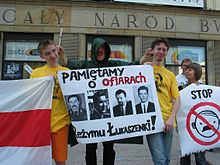Viktor Hanjar

Wiktar Hantschar ( Belarusian Віктар Ганчар ; Russian Виктор Гончар ; Viktor Gonchar; born September 7, 1958 in Rodichevo, Minskaya Woblasz ; † 1999 (?)) Was a Belarusian politician . He disappeared on September 16, 1999 under unknown circumstances.
Life
Wiktar Hantschar was born on September 7, 1958 in the village of Radsichava in Minskaya Woblasz . He completed a law degree at the Belarusian State University and worked at the Institute of Philosophy and Law at the National Academy of Sciences of Belarus . Hantschar was a lecturer at the Belarusian Economic Institute and headed the economic and legal department of the State Economic Planning Committee. He was also the first deputy chairman of the Executive Committee of the City of Maladechna and briefly deputy prime minister of Belarus. He was Secretary General of the Economic Court of the Commonwealth of Independent States . From 1990 to 1995 he was a deputy to the Supreme Soviet of Belarus.
In 1996, Hantschar was appointed chairman of the Central Electoral Commission and was vice-president of the parliament, which was dissolved in 1996 by President Aljaksandr Lukashenka . Hantschar refused to recognize the result of the controversial constitutional referendum initiated by Lukashenka in 1996. On September 19, 1999, he was supposed to give a speech on the political situation in the country before the parliament, which was dissolved in 1996. A delegation from the opposition should also be elected at this meeting , which, through the mediation of the Organization for Security and Cooperation in Europe (OSCE), should start talks with the Belarusian government.
kidnapping
On the afternoon of September 16, 1999, Viktor Hanjar and his friend Anatol Krassouski , who financed the opposition, were kidnapped in front of a bathhouse on Fabrychnaja Street (Вуліца Фабрычная) in Minsk . Fragments of glass from Krassouski's car and traces of blood from Hantschar were later found on site. The perpetrators could not be identified.
In 2004, a special investigator from the Council of Europe concluded that a special unit of the Belarusian Ministry of the Interior was behind the kidnapping of Juryy Sakharanka , Hantschar and Krassouski. In December 2019, Deutsche Welle released a documentary film in which Juryj Harauski, a former member of the Belarusian special unit, confirmed that his unit had kidnapped and murdered Hantschar and Krassouski.
Hantschar was posthumously awarded the Theodor Haecker Prize in 2000.
Individual evidence
- ↑ Biography on ciwr.org
- ↑ a b Threatened abuse and torture / Threatened "disappearance" . amnesty.de. November 25, 1999. Archived from the original on July 12, 2016. Retrieved July 12, 2016.
- ↑ Jan Maksymiuk: "Where are Belarus's Disappeared Oppositionists?" , Hri.org, May 19, 2000.
- ↑ "Kidnapping of Hanchar and Krasouski: authorities have something to hide" , charter97.org, September 16, 2009.
- ↑ "The Minsk Murders - A Key Witness Breaks His Silence" , DW, December 16, 2019.
| personal data | |
|---|---|
| SURNAME | Hantschar, Viktor |
| ALTERNATIVE NAMES | Ганчар, Віктар (Belarusian) |
| BRIEF DESCRIPTION | Belarusian politician |
| DATE OF BIRTH | September 7, 1958 |
| PLACE OF BIRTH | Roditschewo, Minskaya Woblasz , Belarus |
| DATE OF DEATH | after September 16, 1999 |